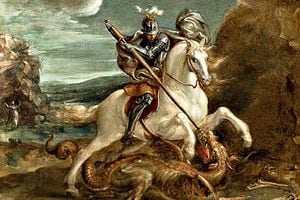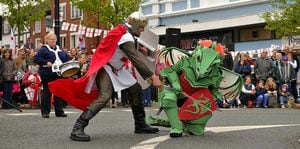Poll: Fly the flag for St George's Day
It might not be popular, it might not be politically correct – at least according to the chattering classes – but today we are proud to say: "Happy St George's Day".

Across the country celebrations 'from the archaic to the eccentric' were taking place to honour our patron saint as David Cameron finally admitted that it's a day that's been overlooked for too long.
Planned celebrations included a feast in Trafalgar Square, bell ringing at churches across the country and, proving that we English still have an eccentricity that is misunderstood across the rest of the world, an annual 'asparagus run' in Worcestershire.

While there are large St Patrick's Day parades in several English cities, including Birmingham, the nation's patron saint day, which is celebrated today to mark the anniversary of St George's death in AD 303, has traditionally been a somewhat low-key affair. In the past there has been a reluctance to mark the occasion over fears the St George Cross flag could be seen as racist and events could upset ethnic minority groups.
Share your thoughts in our daily poll:
But this year, the Prime Minister said that the cross of St George would be flying proudly above No 10 as we honour everything it is to be English.
Mr Cameron said: "Up and down the country – including here in Downing Street – the flag of St George is flying high and celebrations – from the archaic to the eccentric – are taking place.
"St George has been England's patron saint since 1350. But for too long, his feast day – England's national day – has been overlooked.
"Today, though, more and more people are coming together, eager to celebrate everything it is to be English. And there is much to celebrate. Because this is a country whose achievements in industry, in technology, sport, music, literature and the arts – they far outweigh our size."

Now it could be cynically argued that Mr Cameron is taking the opportunity offered by St George's Day to target some of the voters expected to come out in their droves to support Ukip at next month's European elections. Because, despite Mr Cameron's chest beating and repeated calls from proud nationalists there is, at yet, no sign of the government giving way to public calls to make St George's Day a public holiday.
In 2007, Graham Smith, who launched the St George Unofficial Bank Holiday campaign the year before, was convinced it would be so within two or three years.
"I'm very disappointed," he said. "It is almost an anti-English sentiment within various governments. This is not aimed at one particular party, they just don't seem to want to grasp English nationalism.
"What we have realised is that England on its own will not get a bank holiday, we are the last in the queue, so it is once Scotland gets independence and they make St Andrew's Day a bank holiday and the Welsh make St David's Day a bank holiday, the pressure will be too much not to make St George's Day a bank holiday.
"So unfortunately the fate of a St George's Day bank holiday rests with the Scottish and the Welsh, when they make their saint's day a bank holiday, then we will get ours."

It seems that even those at Google recognise today's importance. Log on to their page today and you'll see one of their celebrated 'Google Doodles', showing an animation featuring George on horseback ready to fight the dragon.
According to medieval legend, George was martyred as he saved an innocent maiden from her death. However, aside from the myth telling of his chivalry, little is known about the real man who lived in the fourth century. Saint George is thought to have been born in Cappadocia, now modern-day Turkey, to an upper-class Christian family.
Historians believe he became a solider, like his father, and joined the retinue of Diocletian, the Roman Emperor at the time.
Despite orders from Diocletian, Saint George is said to have refused to persecute Christians.
The martyrdom retold in Saint George's legend appears to be historically accurate, as he is believed to have died in 303 AD, after being tortured and executed in Palestine.
It is his death, and the quintessential nature of being English that we celebrate today.





